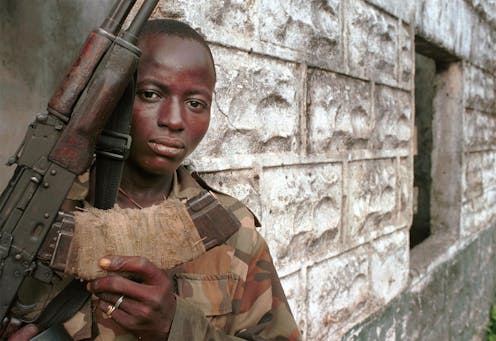
Sierra Leone’s June 2023 parliamentary elections are the fifth since the end of the civil war in 2002.
They also mark a decade since the closure of the Special Court for Sierra Leone. The court prosecuted high level commanders deemed responsible for the suffering experienced during the war.
The 11-year-long civil war (1991-2002) was estimated to have killed over 50,000 people. Thousands were maimed and their limbs amputated. Half of the population was displaced. Almost all the people of Sierra Leone were affected by the war, leaving an enduring scar on the country and the collective psyche.
In the late 1990s and early 2000s, academics and peacebuilders became increasingly interested in promoting transitional justice alongside other methods of peace consolidation, particularly in countries that had experienced mass violence and large-scale atrocities. These included South Africa, Rwanda, Bosnia and Peru.
Transitional justice mechanisms
Transitional justice is justice adapted to societies undergoing transformation away from “normalised” human rights abuse.
Sierra Leone became the first in which two transitional justice mechanisms were used. The Sierra Leone Truth and Reconciliation Commission was set up in July 2002 and a Special Court was created.
The country has remained relatively peaceful in the two decades since the war ended. This is in a stark contrast to other examples such as Liberia and the Democratic Republic of Congo.
In my thesis I reflected on the long-term impact and the legacy of transitional justice in Sierra Leone. I examined whether lessons learned could assist in improving the process for future use.
My research focused on the official transitional justice mechanisms and whether the underlying causes of the war continued to affect the people of Sierra Leone. Economic mismanagement, poor governance, abject poverty and severe disenfranchisement were some of those underlying causes.
Through interviews with people who worked alongside the mechanisms and in non-government organisations, as well as others in civil society, I gained a better understanding of the lasting impact of transitional justice.
Transitional justice in the long term
While in Sierra Leone, I had candid discussions on the implementation, limitations and legacy of the official transitional justice mechanisms. I found there were operational tensions between the Truth Commission and the Special Court, but having both gave Sierra Leoneans restorative and retributive justice. Some thought that the Special Court undermined the existing amnesty and pardon agreements while using limited resources for both mechanisms was not ideal. These led to the tensions between the two mechanisms.
Restorative justice refers to “an approach to justice that seeks to repair harm by providing an opportunity for those harmed and those who take responsibility for the harm to communicate about and address their needs in the aftermath of a crime.” Retributive justice is a system of criminal justice based on the punishment of offenders rather than on rehabilitation. Considering the impact of the war, incorporating both mechanisms was essential in helping the society to reconcile and rebuild.
My discussions also showed there was room for improvement in the way the two mechanisms worked. Both were hampered due to limited funding, more funds could have made their work easier. There should have been wider community engagement and consultation also before both started operations. Their effectiveness and acceptance was largely the result of outreach teams at grassroots level focusing on ensuring that the process benefited as much of the population as possible.
The Truth Commission and the Special Court have left a legacy: they are still able to promote reconciliation and societal restoration now. This is despite the fact that access to the commission’s report has been limited. A video edition of the report was circulated widely around the country, but the number of physical copies of the report is limited. Information about the findings and recommendations is restricted to the commission’s website.
Nevertheless, through the recommendations resulting from the victim testimonies, the report led to the establishment of an Anti-Corruption Commission. This addresses exploitative practices in the chieftaincy system and acknowledges systematic youth disenfranchisement. The effectiveness of the recommendations is debatable, but their ongoing influence demonstrates a concerted effort to ensure that certain causes of the conflict do not resurface.
Similarly, through the Residual Special Court for Sierra Leone, which replaced the Special Court, the legacy of accountability and the rule of law continues. It still promotes societal reconstruction, reconciliation and collaboration. For example, there is a programme to reintegrate former war criminals back into the community. This acknowledges collective trauma but works towards peace in the long term.
A long way forward
It is vital to continue examining what transitional justice can do. This is because its mechanisms are put to work over a short period but aim at long-term and lasting peace.
My research also explored the current situation in a more holistic way. Particularly, it considered how socio-economic pressures continue to affect income generation and perceptions of disenfranchisement. Despite the Truth Commission’s acknowledgement of the fact that socio-economic injustice had a serious impact on the pre-war society, such issues persist. They are seen through youth disenfranchisement and underdevelopment.
Through this research I found that the peace which Sierra Leone has experienced in the last two decades was achieved through collaborative efforts. These are the legacy of transitional justice and its relationship to long-term peace, and the resilience of the Sierra Leonean people.
There is still more to learn, including how better to incorporate socio-economic aspects of peacebuilding. This might help to rectify the deeply entrenched causes of war, which current processes are not fully capable of addressing.
Christina Mammone receives funding from Flinders University. While undertaking my PhD research: 2018 awarded Flinders University Overseas Travel Grant 2020 awarded Flinders University Write-up Stipend Scholarship
This article was originally published on The Conversation. Read the original article.







